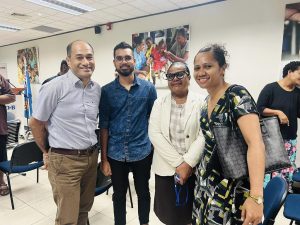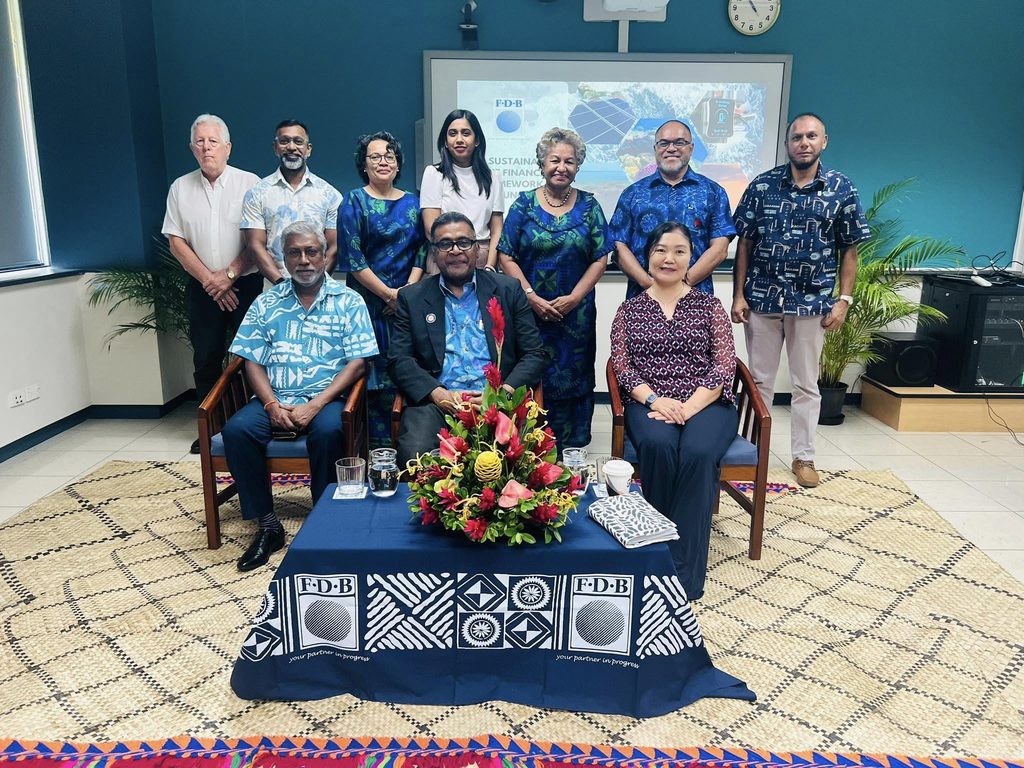THE Fiji Development Bank (FDB) has launched its Sustainable Blue Finance Framework last week that aims to realign its lending products to support Fiji’s blue economy ambitions and meet the country’s sustainable development aspirations.
The Blue Finance Framework is the result of a constructive collaboration between the development bank, United Nations Development Programme (UNDP) and UN Capital Development Fund (UNCDF) over two years.
It began with an intensive internal assessment of the bank’s portfolio, followed by a thorough external consultation leading to the design of the framework, the bank said.
That included the bank contributing to the design of the Fiji Sustainable Blue Bond Framework eligibility criteria, as well as the Blue Investment Fund.
FDB chief executive officer Filimoni Waqabaca said the framework included policy and strategy statements, as well as the FDB Sustainable Blue Loans guidelines.
He said a wide staff training of the sustainable blue loans’ facility was carried out across the 11 branches from Viti Levu to Vanua Levu, and Taveuni in early March.
FDB mandate
Mr Waqabaca said as a State-owned development financial institution, the bank had a strong development mandate aimed at contributing to the sustainable development of the country by providing capital and other resources for investments in strategic sectors.
He said the bank acknowledged the importance of incorporating sustainability in its business decision making, aimed to minimise negative social and environmental impact of its services, and ensuring they could contribute positively, including the protection, restoration and enhancement of ecosystems and the people who depend on them.
Consequently, he added the FDB was committed to mobilise financial resources to meet Fiji’s climate objectives and sustainable development aspirations.
“So, today’s launch will see FDB raising its own capital to lend to public and private sector entities incorporated in Fiji,” Mr Waqabaca said at the launch at the FDB headquarters in Suva last Friday.
He said the bank was also aware of the need to provide interest rate concessionally to allow for businesses to transition towards sustainable business operation.
And in that respect, Mr Waqabaca said they were open to partner with like-minded organisations.
“The bank’s strategic plan aligns with these emerging markets when it comes to diversifying its revenue and funding base, enhancing customer service experience, market share growth, customer retention and acquisition, knowledge worker development and culture.
“The shift towards sustainability might not be fully realised but it is happening, and FDB is making sure that financial mechanisms match the pace of change.”
Assistant Minister for Finance Esrom Immanuel said the launch of the framework represented a locally led pioneering feat ins sustainable development and climate finance.
He said the development bank was taking bold steps to align its financing approach with the needs of Fiji’s blue economy – supporting projects that enhanced coastal resilience, drove sustainable marine-based enterprises, and strengthened Fiji’s economy and environmental security.
“I am glad this initiative by FDB will help to unlock the development potential of Fiji’s blue economy,” Mr Immanuel said.
“The ocean defines out homes. It shapes our lives, feeds our families, carries our trade, and holds our history. The sea has always provided, and it will continue to do so, but only if we choose to honour its role in our future.”
Mr Immanuel said the framework strengthened the country’s national commitment to ensure investment flowed into industries that prepared for the future.
“This will be for fishing enterprises that leave enough water to fish again or for shipping operators who see lower emissions as a competitive edge.”
What to expect from FDB Sustainable Blue Loans?
As from April 1 this year, financing will be available for eligible projects that will deliver focussed environmental and social benefits that are aligned with the Eligible Blue Categories as defined in the
Fijian Sustainable Bond Framework (FSBF).
Mr Waqabaca said special consideration would be given, but not limited to, investments in priority sectors: blue shipping and e-mobility; sustainable fisheries and aquaculture/mariculture; sustainable eco-tourism; and sustainable agriculture.
He said adopting a strategy to implement and increasingly grow the share of sustainable blue finance investments would:
– Reduce environmental risk associated with the loans offered;
– Align the bank to Sustainable Development Goals (SDG) as well as Fiji’s ocean policy, the National Development Plan, while creating the market differentiation for the bank.
Mr Waqabaca said the Sustainable Blue Finance Framework was an attempt for the bank to partner with development partners such as the UNDP and UNCDF to ensure access to capital was broad, fair and equitable, and directed toward those who drove sustainable economic activity.
He said it was also an attempt to partner with SME business owners, coastal and marine entrepreneurs, women and youth-led enterprises, “those who have often been overlooked as well as inland entrepreneurs operating within 50km from a river or stream”.
“I’m very excited to highlight that momentum is already building for the bank. This includes expanding technical assistance and frameworks for decarbonising transport, scaling up renewable energy, and advancing climate adaptation finance.”
Credit guarantee
Mr Immanuel said for the Blue Finance Framework to reach its full potential, they must acknowledge the next major challenge – appropriate credit guarantees.
He said to fully harness the power of institutions like FDB, they must establish risk-mitigation mechanisms that lowered the exposure of local financial institutions, enabling them to lend more at affordable rates.
“A well structured guarantee scheme will provide the confidence needed for increased investments in the blue economy, unlocking new opportunities for Fijian businesses, communities and entrepreneurs,” Mr Immanuel said while launching the initiative.
UNDP Resident Representative Munkhtuya Altangerel said UNDP and UNCDF remained steadfast to support Fiji’s efforts to operationalise its National Development Plan (NDP) and National Oceans Policy.
“Through one of our flagship projects – jointly implemented by UNDP, UNCDF and UNEP, and funded by the Global Fund for Coral Reefs and the Joint SDG Fund – we are exploring the possibility of placing a credit guarantee with FDB to help de-risk lending under its new Blue Finance Framework and Lending Programme that we are here to launch,” Ms Altangerel said.
She said that would provider greater security to FDB as a financial institution and unlock opportunities for affordable concessional finance to those who need them most.”
“The FDB’s Blue Finance Framework will ensure sustainable economic growth and environmental stewardship go hand in hand, paving the way for a resilient and prosperous blue economy.”
Mr Immanuel said to truly mobilise required financing for sustainable development ambitions, “we must create locally grown solutions that unlock this domestic capital”.
He said the global financial landscape was shifting and access to concessional finance and grants was becoming increasingly competitive.
“We must demonstrate our capability to design and execute innovative blended finance solutions that leverage the significant domestic liquidity available right here in Fiji – liquidity that currently sits at a historic high of over a billion Fijian dollars,” he said.
Taking action
Mr Waqabaca said strong businesses anticipate change and they position themselves early, assess and understand risk, and they act ‘before’ the opportunity passes.
He said that was why FDB had taken action with the framework now in place and the opportunity here right now.
“For those ready to build a sustainable future for Fiji, the path is now open wider than ever before. We encourage businesses to come and join us in restoring, protecting, and maintaining the diversity, productivity, and resilience of ecosystems, while improving livelihoods and creating jobs,” the CEO said.
“Let us strive to base our business operations with clean technologies, renewable energy, and circular material flows for our generation and for the future.”

NOTE: This article was first published in the print edition of the Fiji Times dated April 1, 2025.



